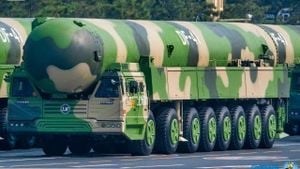The Israeli-Palestinian conflict has once again taken center stage, capturing the world’s attention as countries grapple with the chaotic consequences of renewed hostilities. The situation has escalated tragically since the latest eruption of violence began on October 7, 2023, following unprecedented rocket attacks on Israel from the Gaza Strip by Hamas. This led to retaliatory strikes from Israel and ignited fears of severe humanitarian fallout. This conflict, marked by accusations of war crimes from both sides, is currently being viewed from various international perspectives.
Palestine recently submitted evidence to the International Criminal Court (ICC) detailing the use of white phosphorus by Israeli forces during their operations. Mahmood al-Habbash, aide to Palestinian President Mahmoud Abbas, revealed on October 28, 2024, at the BRICS Summit held in Kazan, Russia, “Documented evidence and information have been provided confirming Israel’s actions and involvement in violations, war crimes, and genocide.” Al-Habbash emphasized the scale of these alleged actions, stating millions witnessed the use of white phosphorus during multiple Israeli attacks on Gaza. He added, “The damage caused by the white phosphorus has been documented and submitted to the ICC.”
This development has underscored global concerns, particularly with estimates of Palestinian casualties skyrocketing amid the violence. The Gaza Health Ministry reports over 44,000 Palestinians—predominantly women and children—have lost their lives since the start of the conflict. Injuries exceed 100,000, emphasizing the urgent need for humanitarian assistance.
Meanwhile, the international community is actively weighing its options. Iran, one of Israel's regional adversaries, has expressed potential retaliation for recent strikes against its military sites, stating, “Israel’s attack must not be underestimated.” The heightened tensions are forcing Arab countries to reassess their positions as reports surface of civilian casualties and violations attributed to Israeli operations.
Jordan, for its part, has openly accused Israel of war crimes following the deaths of 65 Palestinians in attacks on northern Gaza, as noted by Jordan's Minister of Foreign Affairs. This assertion is part of broader calls from numerous nations for accountability and increased scrutiny over Israel’s military conduct.
Adding to the alarming developments, Francesca Albanese, the UN special rapporteur on the occupied Palestinian territories, delivered stark warnings about the risks of genocide facing the entire Gaza population. She stated, “The entire population of Gaza is at risk of dying,” and highlighted the dire humanitarian conditions under which many reside.
Heather Barr, from Human Rights Watch, has also urged the international community to intervene, stating, “What we’re witnessing is horrific,” urging leaders to respond not just with words but with action to hold those responsible for alleged atrocities accountable.
The humanitarian crisis is compounded by reports of severe restrictions on food and medical supplies, virtually choking the Gaza Strip. Joyce Msuya, acting UN Under-Secretary-General for Humanitarian Affairs, issued calls for immediate action to alleviate the suffering, asserting, “What Israeli forces are doing cannot be allowed to continue.”
With the population of Gaza nearing 2.23 million, and blockades severely impacting basic living conditions, the situation escalates daily. The World Health Organization reported dire health risks, stating Northern Gaza is experiencing catastrophic conditions due to constant strikes. Civilians are forced to make heartbreaking decisions between fleeing for their lives or facing starvation.
After witnessing the military escalation, Turkey’s President Recep Tayyip Erdogan openly condemned the Israeli actions, labeling them as brutal and calling for immediate international intervention. He pointed out the plight of innocent civilians being caught amid the conflict, stirring thoughts among his constituents and urging for unity against perceived injustices.
Many have noticed the patterns of international responses concerning humanitarian crises. Observers noted how Western nations’ support—or lack thereof—for Israel often shapes their reactions. For example, criticisms directed at Israel often seem overshadowed by geopolitical relationships, particularly from the United States, which has faced calls both domestically and internationally to reassess its unwavering support amid allegations of war crimes.
South Africa, echoing global sentiments, is moving to develop and file detailed documentation with the ICC to address claims of genocide associated with Israel's military actions. It is seen as part of broader global efforts to hold parties accountable under international law and restore basic human rights.
Humanitarian aid organizations continue their salvage operations under incredibly challenging conditions, yet they voice frustration at the slow pace of assistance being allowed entry to the region. Despite the evident crisis, recurrent discussions among global leaders highlight the stalemate and political gridlock deterring effective resolutions. Many question how long the international community will sit idly by as humanitarian crises deepen, wondering what it will take to unify efforts toward peace.
Calls for ceasing hostilities echo loudly, with various Arab leaders urging for immediate dialogue to avert escalation. Regional discussions indicate shifts in alliances, with leaders acknowledging the need for collaborative dialogue to de-escalate tensions between Israel and Palestine, as well as the broader Middle East.
The situation remains fluid, with urgent calls from many nations for immediate humanitarian intervention and long-lasting resolutions. Notably, civilians’ suffering and dire conditions continue to permeate global chatter, raising concerns about the effectiveness of international bodies to enforce peace and protect lives.
Global leaders now face increasing pressure to navigate this highly complex scenario. Will they take decisive action to address the humanitarian crisis, or will the situation continue to spiral? The world watches closely as developments rapidly evolve, with human lives hanging precariously on the balance.



